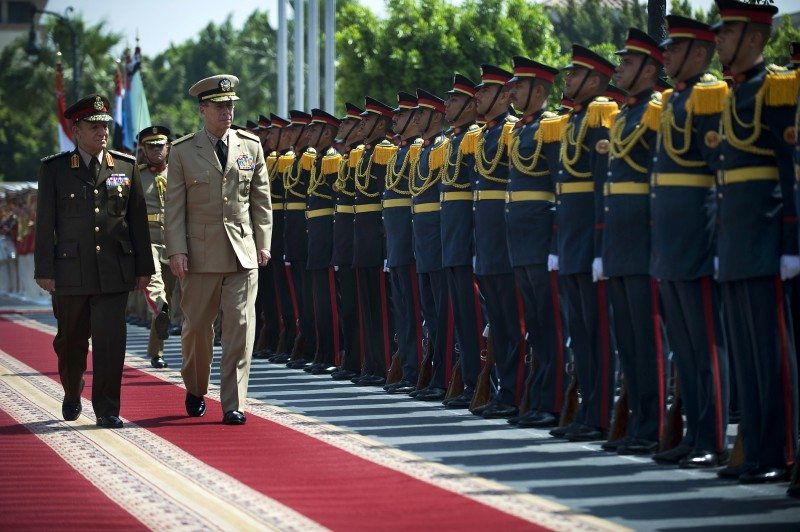Egypt’s new military rulers dismantled ousted strongman Hosni Mubarak’s regime, dissolving parliament, suspending the constitution and promising a referendum on political reform.
While the civilian cabinet met for the first time since Mubarak’s downfall, the generals made it clear where authority now lies, issuing a proclamation setting a six-month timetable to prepare democratic elections.
The latest moves spelled the end of the political system that underpinned Mubarak’s 30-year rule, which ended on Friday when he was driven from power after an 18-day pro-democracy uprising.
The Supreme Council of the Armed Forces’ “communique number five” said it would “run the affairs of the country on a temporary basis for six months or until the end of parliamentary and presidential elections.”
The communique — read on state television — said the military would form a panel to rewrite the constitution, which effectively locked down power for Mubarak’s National Democratic Party (NDP), and submit it to a referendum.
The dissolved legislative body was seen as illegitimate following elections last year that were marred by widespread allegations of fraud and gave the NDP an overwhelming majority.
The statement also confirmed that the chairman of the supreme military council, Mubarak’s defence minister Field Marshal Mohammed Hussein Tantawi, was now de facto head of state and represented Egypt on the international stage.
There was violence Sunday as the widely hated police force marched in support of the uprising.
Troops fired warning shots and scuffles broke out when policemen protested to restore their reputation and win pay rises after they found themselves on the wrong side of the uprising.
One policeman’s teeth were smashed in during a fight with soldiers outside the interior ministry, where around 1,500 members of the force called for the despised former interior minister Habib al-Adly to be publicly executed.
Troops had fired over the heads of the protesters, some of whom were in police uniform, as the crowd chanted at their former boss: “Habib, you know you will be executed in the public square!”
Egypt’s police are broadly despised and seen as brutal and corrupt, while the military has been embraced by the anti-regime protesters.
But the police protesting on Sunday insisted they had been ordered to deal harshly with the protests and were underpaid by their government masters.
Sunday’s cabinet meeting came a day after the resignation of the highly unpopular information minister Anas al-Fiki, who was allegedly behind a media campaign that presented protesters as foreign agents.
Mubarak appointed the cabinet — mostly veteran military men — in the opening days of the revolt in a failed bid to appease the protesters.
Fiki, Adly and sacked prime minister Ahmed Nazif have all been banned from leaving the country while they are investigated over graft allegations.
A judicial source told AFP on Sunday the prosecutor general would begin questioning Adly “within hours”.
Tantawi on Sunday met new Interior Minister Mahmud Wagdy, in order to get the police back on the streets as quickly as possible.
Prime Minister Ahmed Shafiq said Mubarak remained at his residence in the Sinai resort town of Sharm el-Sheikh.
Meanwhile, the Egyptian Museum announced that several priceless artefacts had been looted during the initial unrest sparked by the revolt.
Zahi Hawass, minister of state for antiquities, said a statue of boy king Tutankhamun and several other ancient treasures had been stolen from the museum.
The missing objects include “a gilded wood statue of the 18th Dynasty king Tutankhamun being carried by a goddess” and parts of another statue showing him harpooning, he said.
Looters had broken into the museum off Cairo’s Tahrir Square on January 28, during clashes between protesters and riot police who used tear gas and water cannon to try to crush the revolt before being driven from the streets.
In the meantime, military police were directing cars through Tahrir Square, the epicentre of the revolt.
Hundreds of thousands of people who had occupied the emblematic square returned home by Sunday after a massive volunteer clean-up effort saw people from all walks of life sweeping the streets and collecting rubbish.
In Britain, Business Secretary Vince Cable urged the international community to take “concerted” action to deal with any Mubarak assets held abroad as pressure grew on London to freeze any of his wealth in the country.










